
Warren Buffett once said: “The business schools reward difficult complex behaviour more than simple behaviour, but simple behaviour is more effective.”
One of the areas where this is absolutely true is investing. The financial industry and, to some extent, the financial media, have a vested interest in making investing more complex than it needs to be. But while complexity can appear intelligent, it’s simplicity that almost always yields better results.
In this article, CAROLYN GOWEN sets out ten simple ways to improve your investment returns.
Many people think that investing is complex or that you have to have an insane amount of funds, stocks, bonds, etc. to have a great portfolio.
I think most investors would agree that 2020 has been a remarkable year so far. As the global pandemic took hold and spread from Asia to Europe and the US there was a brutal reaction by world stock markets, which recorded some of the biggest one-day falls in almost 100 years.
The markets’ reaction made total sense. In the wake of a highly contagious virus, for which there is no cure, and an environment where most of the developed world basically shut down their economies, the markets’ reaction surely could have surprised no one.
What did catch investors by surprise was the speed at which markets recovered, with many now close to their previous highs.
The pandemic continues to exercise a strong grip in many countries — including the US, the world’s largest economy. A vaccine doesn’t look likely to be available in the short term and as we are trying to kickstart economies again, it looks as though it’s going to be a slow road to recovery, with massive unemployment numbers likely in the coming months.
What should an ordinary investor to do? Well, there are numerous options available. Our view is that there are ten sensible steps which, when employed as your investment strategy and philosophy, should help you to avoid many of the mistakes investors typically make.
1. Embrace market pricing
Accept that the market is generally an effective information-processing machine. In 2019, the daily average trading in world equity markets totalled $443.3B. With each trade, buyers and sellers bring new information to the market, which helps set prices. No one knows what the next bit of new information will be. The future is uncertain, but prices will adjust accordingly. The market may not price assets correctly 100% of the time but accepting the “wisdom of crowds” has proven to be a successful strategy.
2. Don’t try to outguess the market
Many fund managers believe they can identify “mispriced” securities and convert that knowledge into higher returns. But fair market pricing works against such efforts, as indicated by the large proportion of mutual funds that have underperformed their benchmarks. Research shows that over both short- and long-term horizons, the deck is stacked against mutual funds that attempt to outguess the market.
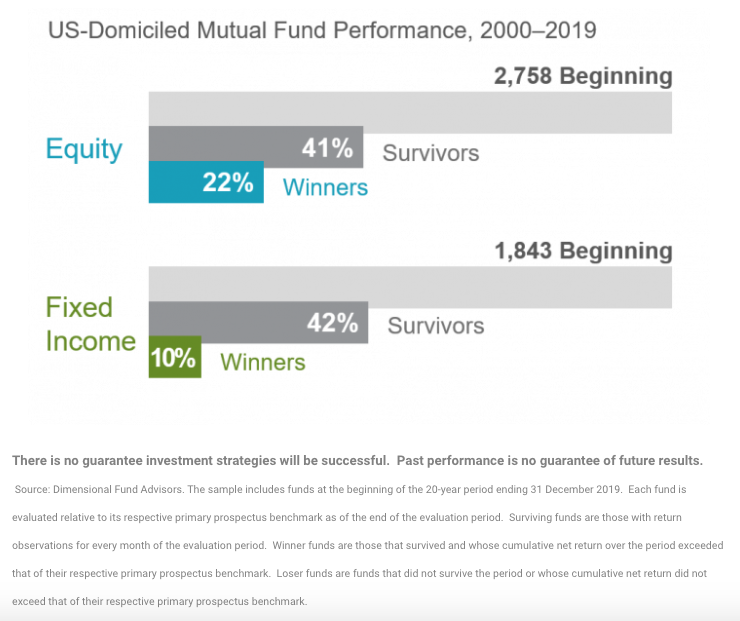
3. Resist performance chasing
Some investors select mutual funds based on their past returns. Yet, past performance offers little insight into a fund’s future returns. For example, most US-domiciled mutual funds in the top quartile of previous five-year returns did not maintain a top‐quartile ranking in the following five years.
4. Let markets work for you
The good news is that the capital markets have rewarded long-term investors. The markets represent capitalism at work in the economy—and historically, free markets have provided a long-term return that has offset inflation.
This is documented in the growth of wealth graph below, which shows monthly performance of various indices and inflation since 1956. These indices represent different areas of the global financial markets.
The data illustrates the beneficial role of stocks in creating real wealth over time. UK Treasury Bills covered inflation, while UK stock returns have far exceeded inflation and significantly outperformed the UK Treasury Bills.
Another key point to note here is that not all stocks are the same. A pound invested in the UK market in 1956 would be worth £1,265 in 2019, compared to £7,068 for UK value stocks and £11,534 for UK small-cap stocks.
Keep in mind that there’s risk and uncertainty in the markets. Historical results may not be repeated in the future. Nevertheless, the market is constantly pricing securities to reflect a positive expected return going forward. If they didn’t, people would not invest their capital.
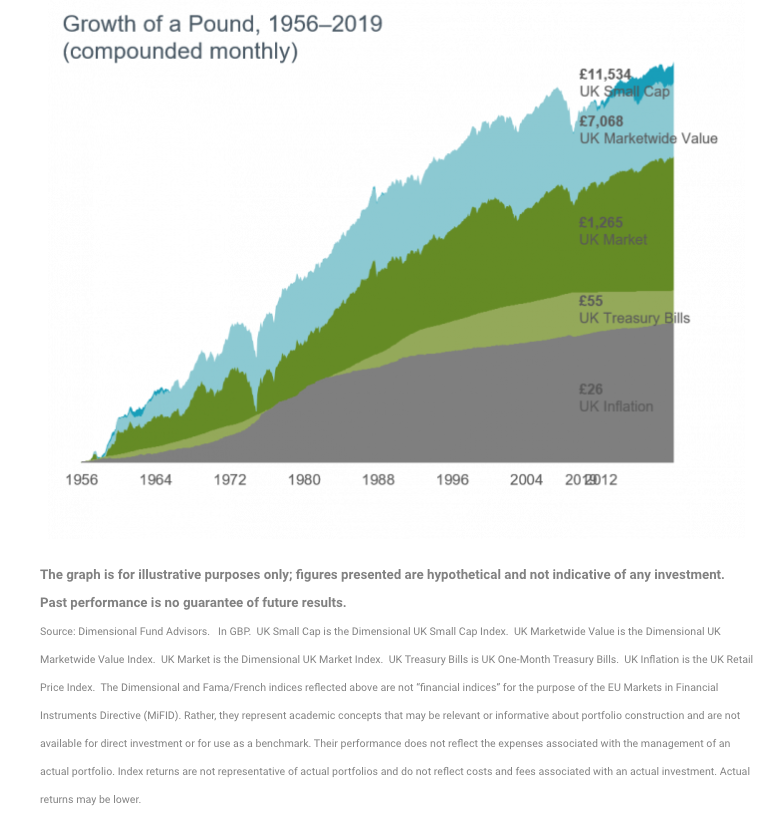
5. Consider the drivers of returns
There is a wealth of academic research into what drives returns. Expected returns depend on current market prices and expected future cash flows. Investors can use this information to pursue higher expected returns in their portfolios.
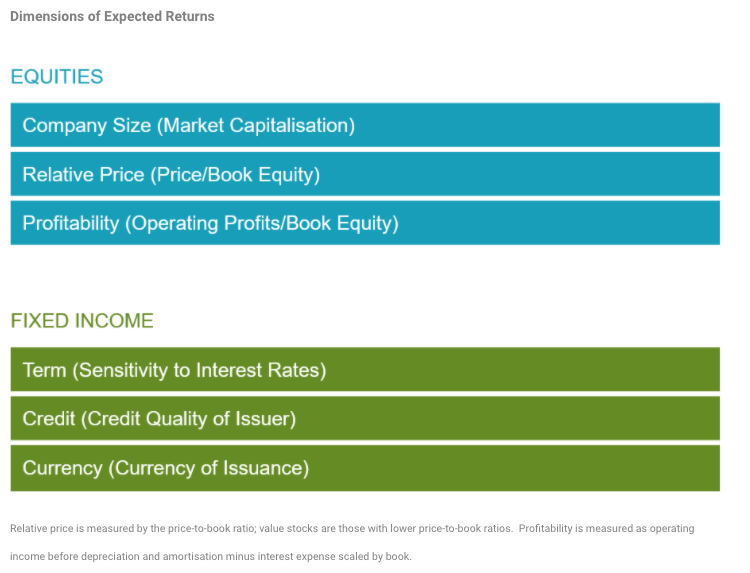
6. Practise smart diversification
Many investors prefer to invest with a ‘home bias’ and / or in a small number of stocks. A large number of US investors never invest outside the US. This has served them well in recent years, but, from a global perspective, limiting one’s investment universe to a handful of stocks, or even one stock market, is a concentrated strategy with possible risk and return implications.
7. Avoid market timing
It is impossible to know which market segments will outperform from year to year. By holding a globally diversified portfolio, investors are well-positioned to seek returns wherever they occur. Tempting as it might be to think a portfolio containing just the FAANG stocks could be the best strategy to employ given their spectacular returns in recent years, it would be a high-risk one to execute. There is no discernible pattern to returns year on year, which is why diversification is often referred to as ‘the only free lunch’.
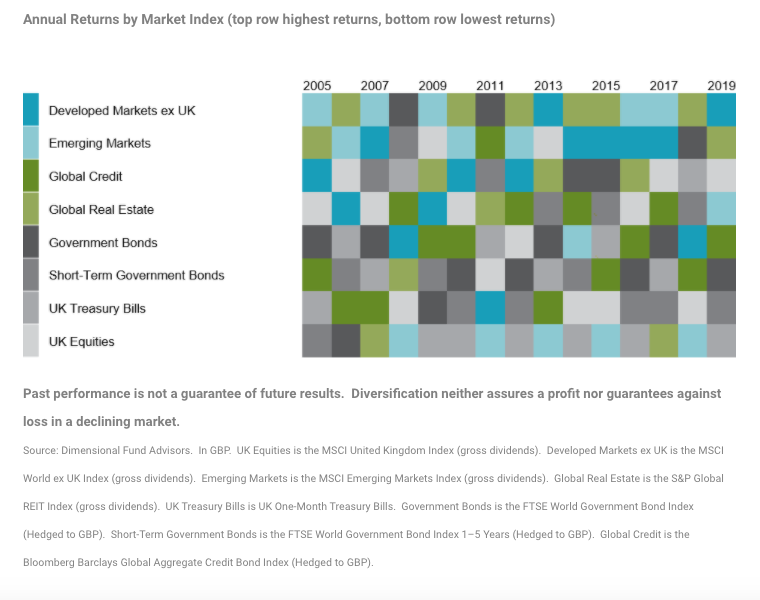
8. Manage your emotions
The 2008–2009 global market downturn was an example of how the cycle of fear and greed can drive an investor’s reactive decisions. Some investors fled the market in early 2009, just before the rebound began. They locked in their losses and then experienced the stress of watching the markets climb.
Staying disciplined through rising and falling markets can pose a challenge, but it is crucial for long-term success.
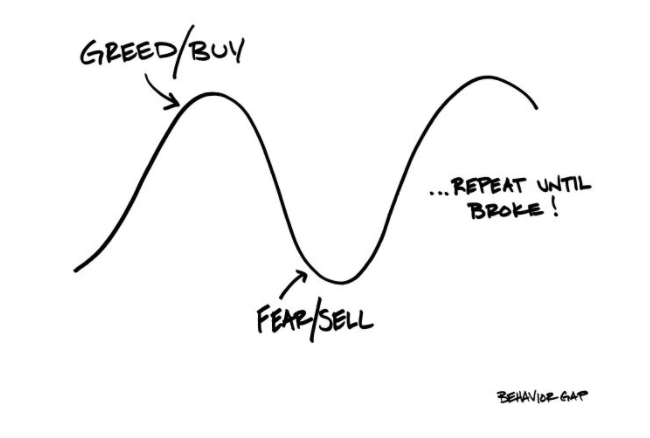
9. Look beyond the headlines
News and financial commentary can influence people’s view of investing. Without a strong investment philosophy to guide them, they also may follow the advice of friends, neighbours or family, especially if the “insight” promises a fast, easy return.
The media uses provocative headlines to drive clicks and views. Their interests are not aligned with yours.
Growing your wealth has no shortcuts. Success requires a solid investment approach, a long-term perspective and discipline to stay the course. Getting wealthier is supposed to be boring.
10. Focus on what you can control
This starts with creating an investment plan based on market principles, informed by financial science and tailored to your specific needs and goals. Focus on actions that will add investment value, such as managing expenses and portfolio turnover while maintaining broad diversification.
And lastly, stay disciplined through various market conditions.

CAROLYN GOWEN is a director and co-owner of Bloomsbury Wealth, an evidence-based financial planning firm based in London. You can follow her on Twitter @CarolynGowen. This post originally appeared on Carolyn’s blog, The Financial Bodyguard.
Here are some of Carolyn’s previous articles on TEBI:
Why we struggle to see we’re being lied to
To help others, help yourself first
Eight investment traps to avoid
A financial plan is about much more than investing
What would you like to read now? Here are some more articles we think you’ll find interesting:
The legacy share class scandal
Is Vanguard the Tom Hanks of asset management?
Market timers are fooling themselves
Stop admiring your successful trades
Three truths about ESG investing
Hedge fund fees are much worse than you thought
Should you invest with Baillie Gifford?
Is there such a thing as a “normal” stock market?









